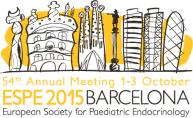
54th Annual ESPE
Barcelona,
Spain
01 Oct 2015 - 03 Oct 2015
Working Groups
Turner Syndrome
hrp0084wg6.1 | Turner Syndrome | ESPE2015
Incidental Prenatal Diagnosis of Turner Syndrome, Perspectives of Parents and Professionals
hrp0084wg6.2 | Turner Syndrome | ESPE2015
The Challenges of Prenatal Diagnosis: The Experience of a Supportive Group for Parents of Children with TS
hrp0084wg6.3 | Turner Syndrome | ESPE2015
Impact of Age at Start and GH Dose for Height Gain and Age at Adult Height in TS Girls
hrp0084wg6.4 | Turner Syndrome | ESPE2015
Management of Middle Ear and Hearing Problems in Turner Syndrome – How Can We Do Better?
Lim David , Donaldson Malcolm , Gault Emma Jane , Clement Andrew , Kubba Haytham , Mason Avril
hrp0084wg6.5 | Turner Syndrome | ESPE2015
Report on the Progress and Difficulties on Transdermal Estradiol Supplementation in Europe
Sas Theo , Ankarberg-Lindgren Carina



